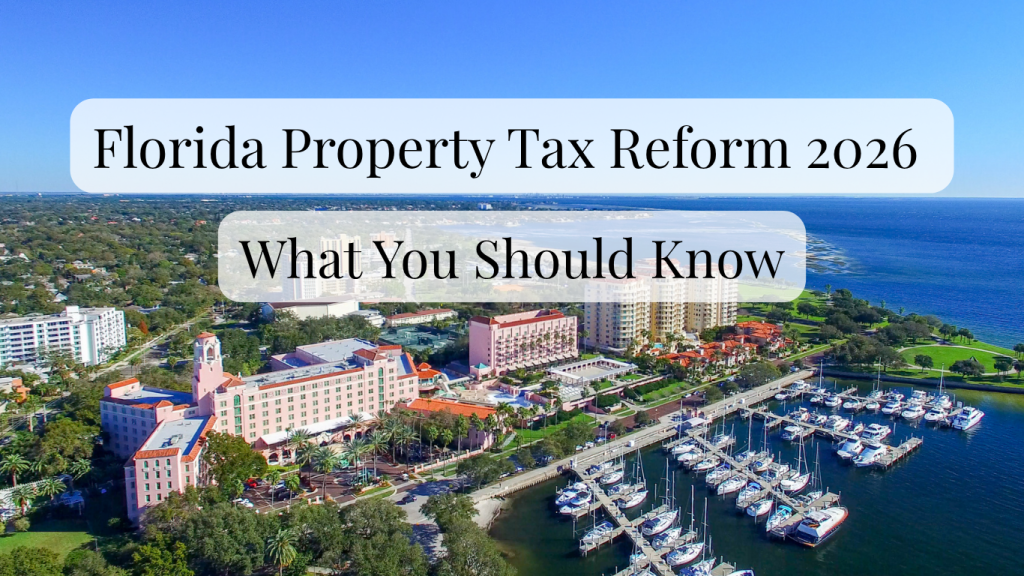
If you haven’t heard all the chatter about the future of property taxes in Florida—let us catch you up.
Governor Ron DeSantis recently announced plans to put a proposal on the 2026 ballot that could end property taxes on primary homes once and for all. If it passes, Florida would be the first state in the country to do it.
It’s a bold idea and it’s sparking some big conversations about how local communities would adapt if that tax revenue went away.
At the same time, the James Madison Institute (JMI) — a Florida-based think tank that focuses on limited government and free-market policies — just released its 2026 policy priorities. They’re calling for property tax reform, too, but not total elimination. Instead, they want to see the state reduce local governments’ heavy reliance on ad valorem (property) taxes to make housing more affordable and promote homeownership.
What’s actually on the table?
Here’s what we know right now:
- The proposal would only apply to primary homes (homesteads). Rentals, vacation homes, and commercial buildings would still pay property taxes.
- To pass, it needs a 3/5 majority in the legislature and 60% voter approval on the 2026 ballot.
- DeSantis has launched the Department of Government Efficiency (DOGE) to audit local budgets and cut wasteful or “politically motivated” spending of property tax dollars.
- JMI’s approach is more gradual — focusing on reform instead of repeal. They support cutting unnecessary spending, lowering tax burdens, and tackling housing costs through zoning reform, fewer permitting delays, and smarter growth policies.
- Opponents, including the Florida League of Cities and the Florida Association of Counties, worry that losing property tax income could hurt local services like schools, police, and infrastructure.
What does this mean to me as a Florida homeowner or property investor?
If you own a primary residence in Florida, this proposal could eventually mean no more yearly property tax bills — just your mortgage, insurance, and utilities. That would be a major savings for many families, especially those on fixed incomes or feeling the squeeze from rising home values and insurance costs.
If you’re an investor or landlord, the impact would be different. Property taxes would still apply to rental and investment properties, but changes in the housing market could still affect you. If property taxes disappear for homeowners, demand for primary residences could surge — potentially driving up prices and competition.
And if you’re considering buying a home in Florida, this could be a game-changer. Many experts predict that if the measure passes, home prices could climb quickly as more buyers rush to take advantage of tax-free ownership.
On the flip side, some local leaders warn that cutting this revenue stream could strain budgets, meaning cities and counties might look for other ways to make up the difference — possibly through higher fees or new types of taxes.
What happens if property taxes are eliminated?
If property taxes on primary homes are removed, Florida’s tax system would likely shift in other ways. The state and local governments would still need to fund essential services like schools, public safety, and infrastructure. That could mean:
- Reallocating funds from the state’s budget surplus to cover local gaps.
- Increasing other types of taxes or fees, such as sales or tourism taxes, to replace lost revenue.
- Cutting back on certain programs or spending, depending on how much is saved through efficiency audits.
Economists say this kind of change could have ripple effects. Homeownership might become more attractive — boosting demand and prices — while renters and investors might see different market dynamics. The key question will be how Florida balances the relief for homeowners with the funding needs of local communities.
Final Thoughts
No matter how it plays out, one thing is clear: Florida is leading a major conversation about the future of homeownership and taxation. Whether it’s full elimination or gradual reform, the 2026 vote could mark a turning point for homeowners, investors, and communities across the state.
Curious how these potential changes could impact your home, investment property, or future plans?
Contact Alla Panteleeva, Broker/Owner of FL Investment Realty, for expert guidance and personalized insight into how Florida’s evolving tax landscape could affect you.
📞 (727) 251-4004 | 📧 allarealtor@hotmail.com
